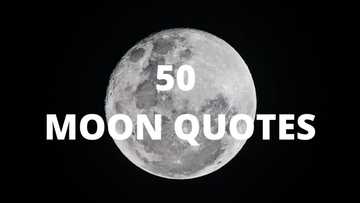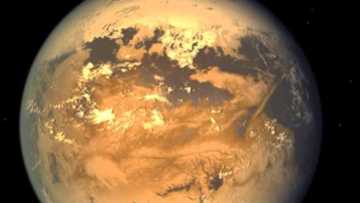100+ space words and their meanings that would be fun to learn
Space is a vast expanse with lots of marvellous and unimaginable things; some are discovered while others remain unknown. Space exploration has revealed a lot to help understand the components of space. Learning some space words will enrich your astronomy vocabulary and enhance your understanding of space composition.
PAY ATTENTION: Click “See First” under the “Following” tab to see Legit.ng News on your Facebook News Feed!

Source: Original
You might have come across various space-related words and wondered what they mean. While some words might seem complex to understand, some are simple and have easy meanings. Have a look at some amazing space words and their meanings to improve your knowledge of space.
Aesthetic words associated with space and the universe
Even though outer space is a mysterious place, it is full of extreme beauty. With components ranging from dust particles to huge rocks, the space has many things to explore. Here are some aesthetic words to enhance your space vocabulary.
- Accretion - A process by which dust and gas accumulate into larger bodies such as stars and planets.
- Antipodal point - A point on the direct opposite side of a planet.
- Binary - A system of two stars that revolve around a common centre of gravity.
- Bolide - A term used to describe an exceptionally bright meteor.
- Disk - The surface of the sun or other celestial body projected against the sky.
- Equinox - The two points at which the sun crosses the celestial equator in its yearly path in the sky.
- Galactic nucleus - A tight concentration of stars and gas found in the innermost regions of a galaxy.
- Giant planet - Planets much larger than the earth.
- Luminosity - The amount of light emitted by a star.
- Meteor - A tiny particle of rock or dust that burns away in the earth's atmosphere.
- Nebula - A cloud of dust and gas in space illuminated by one or more stars.
- Obliquity - The angle between a body's equatorial plane and orbital plane.
- Photosphere - The bright visible surface of the sun.
- Retrograde - When an object moves in the reverse sense of normal motion.
- Satellite - A natural or artificial body in orbit around a planet.
- Solar eclipse - A phenomenon that occurs when the earth passes into the moon's shadow.
- Sunspot - Cooler areas of the sun's surface than surrounding areas.
- Trojan - An object orbiting in the Lagrange points of another (larger) object.
- Variable star - A star whose brightness changes over days, weeks, months, or years.
- Yellow dwarf - An ordinary star such as the sun at a stable point in its evolution.
PAY ATTENTION: Join Legit.ng Telegram channel! Never miss important updates!
Interesting words associated with space
Undoubtedly, some space words are exciting, and you will want to know their meanings when you find such words. Here is a list of some interesting space words you should know.

Source: UGC
- Achondrite - A stone meteorite that contains no chondrules.
- Andromeda galaxy - a spiral galaxy in the constellation of Andromeda that is visible to the naked eye.
- Cepheid variable - This is a variable star whose light pulsates in a regular cycle.
- Constellation - A group of stars that make an imaginary picture in the sky.
- Double star - A group of two stars.
- Exocomet - A comet outside the solar system.
- Fireball - An extremely bright meteor.
- Galilean moons - The name given to Jupiter's four largest moons, Io, Europa, Callisto, and Ganymede.
- Iron meteorite - A meteorite composed mainly of iron mixed with smaller amounts of nickel.
- Kirkwood gaps - Regions in the main belt of asteroids where few or no asteroids are found.
- Meteoroid - A small, rocky object in orbit around the sun, smaller than an asteroid.
- Oort cloud - a spherical shell surrounding everything in the solar system.
- Planetary nebula - A shell of gas surrounding a small, white star.
- Ring galaxy - A galaxy that has a ring-like appearance.
- Seeing - A measure of the atmosphere’s stability.
- Spacewear - Clothes to be worn in space
- Star cluster - A collection of stars orbiting a common centre of mass.
- Stone meteorite - A meteorite that resembles a terrestrial rock and is composed of similar materials.
- Tektite -A small, glassy material formed by the impact of a large body, usually a meteor or asteroid.
- Umbra - The area of total darkness in the shadow caused by an eclipse.
- Zenith - The point in the sky that is directly overhead.
Cool Space Words
What are some cool space words you have ever heard? Even though there are many complicated astrology terminologies, cool and simple space terms also exist. Have a look at the list below.

Source: UGC
- Aphelion - The point in the orbit of a planet or other celestial body where it is farthest from the sun.
- Astrophobia - a severe and irrational fear of stars and space.
- Celestial poles - The North and South poles of the celestial sphere.
- Comet - A gigantic ball of ice and rock that orbit the sun in a highly eccentric orbit.
- Eclipse - The total or partial blocking of one celestial body by another.
- Extragalactic - A term that means outside of or beyond the galaxy.
- Galaxy - A large grouping of stars.
- Half-moon - First or last quarter of lunar eclipse.
- Jet - A narrow stream of gas or particles ejected from an accretion disk surrounding a star or black hole.
- Limb - The outer edge or border of a planet or other celestial body.
- Magnetosphere - The area around a planet most affected by its magnetic field.
- Occultation - An event that occurs when one celestial body conceals or obscures another.
- Parallax - The apparent change in position of two objects viewed from different locations.
- Quasar - A supermassive black hole gorging on gas at the centre of a distant galaxy.
- Rotation - The spin of a body about its axis.
- Solar wind - A flow of charged particles that travel from the sun out into the solar system.
- Stony iron - A meteorite that contains regions resembling both a stone meteorite and an iron meteorite.
- Superior planet - A planet that exists outside the orbit of the earth.
- Supernova remnant - An expanding shell of gas ejected at high speeds by a supernova explosion.
- Variable star - A star that fluctuates in brightness.
- Waning - The changing illumination of the moon (or other body) over time.
Pretty words related to space
Here is a compilation of some pretty space words you might come across.
- Apogee - The point in the moon's orbit or other satellite where it is farthest from the earth.
- Coma - An area of dust or gas surrounding the nucleus of a comet.
- Faculae - Bright patches visible on the sun's surface or photosphere.
- Inclination - A measure of the tilt of a planet's orbital plane in relation to that of the earth.
- Lunar eclipse - A phenomenon that occurs when the moon passes into the earth's shadow.
- Neutrino - A fundamental particle produced by the nuclear reactions in stars.
- Orbit - The path of a celestial body as it moves through space.
- Ejecta - A material from beneath the surface of a body such as a moon or a planet ejected by an impact such as a meteor and distributed around the surface.
- Protostar - Dense regions of molecular clouds where stars are forming.
- Radio galaxy - A galaxy that gives off large amounts of energy in radio waves.
- Stellar wind - The ejection of gas from the surface of a star.
- Supernova - A star ending its life in a huge explosion.
- Terrestrial planet - A name given to a planet composed mainly of rock and iron, similar to that of earth.
- Big bang - The theory that suggests that the universe was formed from a single point in space during a cataclysmic explosion many years ago.
- Celestial equator - An imaginary line that divides the celestial sphere into a northern and southern hemisphere.
- Inferior planet - A planet that orbits between the earth and the sun.
- Space shuttle - a reusable spacecraft with wings for a controlled descent through the earth's atmosphere.
- Star - A massive ball of gas that generates prodigious amounts of energy from nuclear fusion in its hot, dense core.
- Dwarf planet - A celestial body orbiting the sun that is massive enough to be rounded by its gravity but has not cleared its neighbouring region of planetesimals and is not a satellite.
- Virgo cluster - A gigantic cluster of over 2000 galaxies located mainly within the constellation of Virgo.
- White dwarf - A tiny, white star formed when an average-sized star uses up its fuel supply and collapses.
Fancy space-themed words
Looking for fancy space words? Here is a list of fancy space-themed words and their meanings to help you understand what there are.

Source: UGC
- Ablation - A process whereby the atmosphere melts away and removes the surface material of an incoming meteorite.
- Aurora - A glow in a planet's ionosphere caused by the interaction between the planet's magnetic field and charged particles from the sun.
- Blue moon - A term used to describe an extra full that occurs in a season. It usually refers to the third full moon in a season with four full moons.
- Double asteroid - Two asteroids that revolve around each other and are held together by gravity.
- Escape velocity - The speed required for an object to escape the gravitational pull of a planet or other body.
- Flare star - A faint red star that appears to change brightness due to explosions on its surface.
- Hypernova - a very energetic supernova thought to result from an extreme core-collapse scenario.
- Libration - An effect caused by the apparent wobble of the moon as it orbits the earth.
- Main belt - The area between Mars and Jupiter where most of the asteroids in our solar system are found.
- Meteor shower - An event where many meteors enter the earth's atmosphere from the same direction in space at nearly the same time.
- Nova - A star that flares up to several times its original brightness for some time before returning to its original state.
- Perigee - The point in the moon's orbit or other satellite at which it is closest to the earth.
- Red giant - A stage in the evolution of a star when the fuel begins to exhaust and the star expands to about fifty times its normal size.
- Saturn - A giant planet that is surrounded by three planar concentric rings of ice particles; the 6th planet from the sun
- Shell star - A type of star which is believed to be surrounded by a thin envelope of gas, which is often indicated by bright emission lines in its spectrum.
- Star- A giant ball of hot gas that creates and emits its own radiation through nuclear fusion.
- Sunspot - A temporary dark blemish on the sun's surface that is a planet-size region of gas cooler than its surroundings.
- Supermoon - A term used to describe a full moon that occurs during the moon's closest approach to the earth.
- Terminator - The line on the moon or a planet that divides the bright, sunlit part from the part in shadow.
- Tidal force - The differential gravitational pull exerted on any extended body within the gravitational field of another body.
- Zodiac - Greek for circle of animals. It’s the set of constellations situated along the ecliptic in the sky, through which the Sun, Moon, and planets move.
What are heavenly bodies?
They are also known as celestial bodies. They are objects found in space and include planets, stars, moons and comets.
How long is 1 hour in space?
An hour in space is equal to an hour on earth.
Why is the moon not a planet?
The moon is not a planet because it revolves around the earth, unlike other planets, which revolve around the sun. It also does not have a gravitational pull, a common characteristic of planets.
There are many space words, and as space exploration continues, new things are discovered, generating more space terminologies. From the above lists, you can master some space terms and explain them.
READ ALSO: 50+ quotes about lockdown life everyone in the world can relate to
Legit.ng recently published an article about lockdown quotes everyone can relate to. The COVID-19 pandemic brought unprecedented times, and many people learned valuable lessons during the lockdown.
Numerous quotes emerged as people tried to cope with the new lifestyle of staying most of the time indoors. While it seemed a tough moment for many, others found the fun side of it and came up with hilarious, memorable quotes.
Source: Legit.ng









